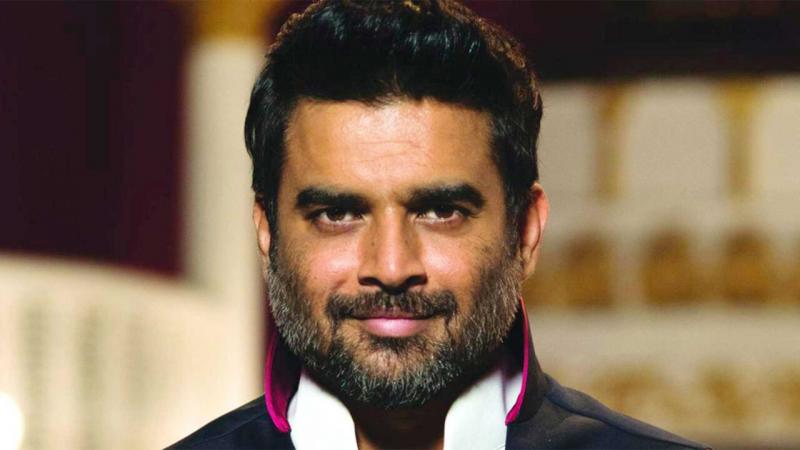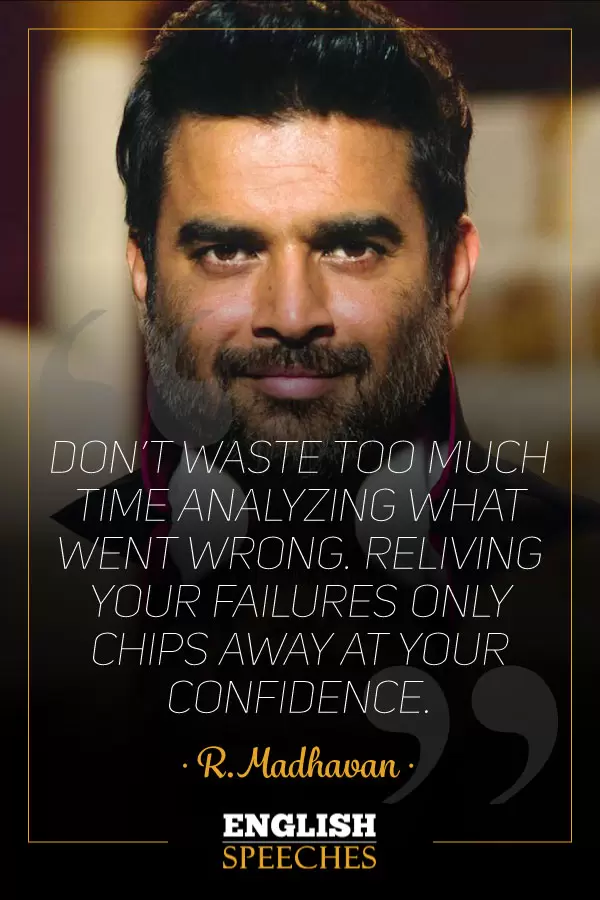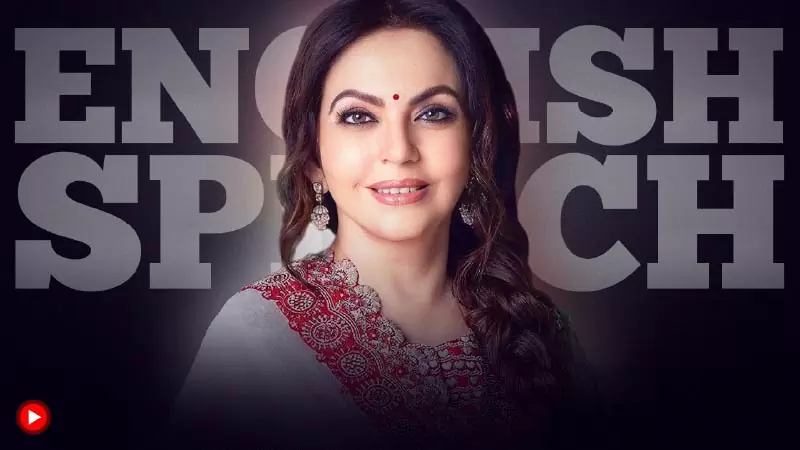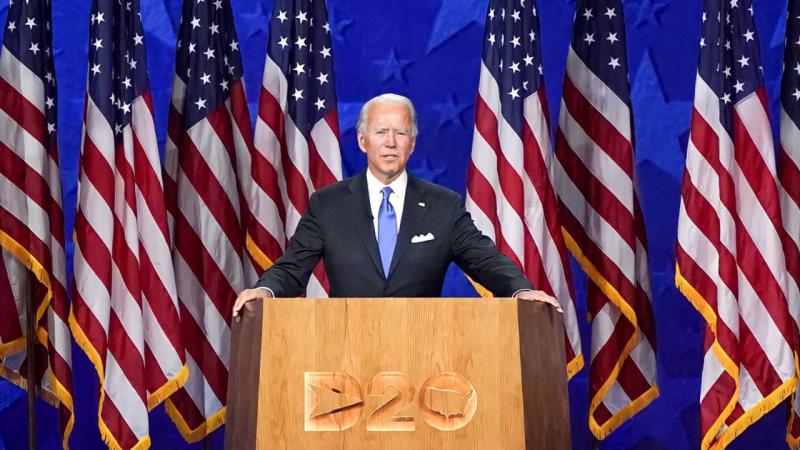R Madhavan Speech: India in 2030
Watch this famous R. Madhavan Speech. The actor addresses the 14th edition of the Indian Conference by Harvard Business School, which is one of the largest student-run conferences with a focus on India in the US. Madhavan spoke on the conference’s theme – India: 2030. He is an Indian award actor, writer, and film producer who has worked predominantly in Hindi and Tamil-language films. Enjoy our Speeches with big English subtitles and keep your English learning journey.
English Speeches also makes this content available for download
Download this Speech in PDF
Download available
for Plus Members
🎯 1000+ English files (PDF, MP3, Lessons)
PDF Transcript
Access the full speech in an
easy-to-read PDF format.
Audio Version
Listen and download clear,
high-quality MP3 recordings.
English Lesson
Includes vocabulary
and grammar practice.
Offer ends in:
01
Days
:
15
Hours
:
29
Mins
:
42
Secs
Offer ended.
Download available
for Plus Members
PDF Transcript
Access the full speech in an
easy-to-read PDF format.
Audio Version
Listen and download clear,
high-quality MP3 recordings.
English Lesson
Includes vocabulary
and grammar practice.
Offer ends in:
Offer ended.
transcript and/or MP3 audio file:
R. Madhavan Quote:
“Don’t waste too much time analyzing what went wrong. Reliving your failures only chips away at your confidence.” R. Madhavan
R. Madhavan full TRANSCRIPT:
“So, first of all, thank you very much for having me here at the Inspire Series. It’s worked dramatically, I’m already inspired to be addressing this really August intellectual gathering of people from Harvard, a place that my mother thought I will never reach.
But you know what, lot of people have spoken before me and eloquently and described their dreams for India and given figures and facts that either are skeptical and like, Mr. Omar says, aspirational. But I’m just an actor and I’m going to just give you my dream shamelessly, because that’s the thing that I can do best.
And by that, I mean when we talk of dreams we have one of our greatest scientists and philanthropists Dr. Abdul Kalam, and he said something which is very interesting. He said, “Dreams are not what you have when you sleep. The true dreams are the ones that don’t let you sleep”.
He said, “When you have that dream once it’s a dream; when you have it twice it becomes a desire. And when you see it for the third time consecutively, it becomes a passion, an aim and a goal”, and that is the passion with which I want to see this fantasy that I have for India 2030.
And Abraham Lincoln also was a dreamer and you know, but he said one thing that makes most sense in trying to achieve this goal that I have dreamed for my nation. He said, “If I have six hours to cut down a tree, then I would spend the first four hours sharpening the axe.” There’s a great philosophy in that.
In this era of instant gratification we just keep thinking we can achieve all these goals by just tweaking this, tweaking that, it’s not true. I really believe that a missionary zeal is required to make that quantum change, that can make 2030 of what I’m dreaming about right now.
And just let’s look at India as a country, what a unique nation! Seriously. Thousands of years old of culture and tradition, many many invasions, being ruled for many years and we still somehow managed to maintain our identity.
We still somehow have managed to maintain our Indian-ness — our beliefs, our faith and you know, yeah, there has been — we have our drawbacks — there is corruption, there is violence, there is differences between the different religions and sects and caste and everything.
But I can’t help but think looking at India at the geography that we’re not doing really that bad. Look at all the other nations around in the world. Look at our neighbors, compared to that there is somebody in India who’s doing something right for us to be called a growing economy and being projected as the third largest economy in 2026 and the most educated and young nation in the world, it’s still functional democracy.
So let’s first accept the fact that there is somebody, some people in India with the right ideas and the ability to lead the nation to where we are today.
Under that assumption — under that assumption we are also very capable of finding very unique solutions to the problems that generally the world faces. And one of them, of course, is the fact that we found freedom through non-violence and non-cooperation; who would’ve thought that was possible?
We have some other – no, seriously I mean it was as radical of thought then as it is today, and one man in a loincloth would believe in faith and complete conviction was able to do that for us — you know, Mahatma Gandhi, and it’s an amazing country of people like Mahavir, Gautam Buddha and Mahatma Gandhi and then Bhagat Singh who also had a dream.
He dreamed then 85 years ago, that I dream of an India where no infant cries for the want of milk, no youngster is deprived of relevant education, and no youth goes door to door finding a job. Sadly, it’s still a dream today.
And I dream of a 2030 when this dream becomes irrelevant. I dream of a 2030 when everybody is so equally satisfied with what they’re doing, that they’re able to actually devote about more time back to art and culture which is another great important aspect of our country.
Now we need to be – for that to happen we need to be a healthy nation. And when I say healthy, I remember preparing for a film of mine which was released recently where I had to look like a boxer and I had this biceps and triceps that had to be there.
So I decided just to work on the parts that is seen outside my clothes. So I was just working out of my biceps and my triceps and my shoulders but you know what I suddenly realized, the strengths that I had in my arms and biceps was not actually enough for me to look even fit because it is disproportionate growth.
It is the kind of growth that will not make you fit or strong but actually make you look inadequate. And that is what is happening to India today.
Everybody says we are the largest economy — we’re going to be the most populated country in the years to come and you know with economic superpower and supremacy in rocket and space technology which I am privy to and then the IT giants and smarter cities.
But ladies and gentlemen, I really believe that more than smarter cities we require smart villages. And this is going to be primarily what I talk about today.
You know, a nation is only as strong as its weakest link and rural India is our weakest link. See, it’s important that growth and progress goes hand-in-hand with villages also getting onto the same train towards economic freedom, super-powerdom, all terms that has been coined for a successful country but that is not happening, the reason being we’re beginning to ignore them, we’re beginning to actually believe that —
This is a very interesting line that I have found, where they say that everybody believes that they know what is required for getting the underprivileged and the poor up to speed with the rest of the country. OK, and we always start assuming that this is what they want; this is how we can help the poor and the villages and this is what they need.
And we can’t be more wrong, because when you assume, and as the spelling goes you make an ass of you and me, let me tell you how that happened to a friend of mine.
His name was — he’s a very profound doctor, a gastroenterologist, and he got a call from his patient Mr. Abdul, who said, “Doctor Saab, my wife is really really ill and she’s got a big stomach ache and she can’t sit and she can’t sleep and she’s in big pain, can I come and visit you?”
And he said, ‘Yes, by all means’.
And like all patients today he’s done his research, he’s gone into the internet and he said, “usko yeh ho sakta hain, wo sakta hain, and the doctor said, ‘Don’t worry let me handle it’. And he checked her out and he said “She has an infected appendix, so I have to do a surgery and she’ll be fine.”
The surgery was done, she was fine and Abdul was a happy man.
One year later, he calls back to doctor and says, “Sir, my wife has got a stomach ache, please do the appendix operation, she’ll be fine.”
And so doctor said — the doctor Manu said, “Listen, I am the doctor, let me diagnose, Abdul, please bring her to the clinic and we’ll fix it up.”
But he said, ‘No, no, sir fix up that operation date, we’ll do it in half an hour and we’ll be back — just she needs that appendix removed’.
So now he’s losing his patience, he says “Let me do the diagnosis, Abdul, bring her to the clinic.” And he’s still insisting and finally the doctor lost it, and he said, “Listen, I am the doctor and let me tell you that every human being has only one appendix, and I have already taken out the appendix. So please don’t tell me how to do my job.”
Abdul waited very patiently for the doctor to finish with his assumptions and then he shot back very meekly, he says, “Sir, I agree with you, every human being can have one appendix but a man can have two wives, right?”
So when we start assuming what the rural India needs, we do what I think is most dangerous. In my vast experiences of shooting in really rural India’s, and villages and small [cook-gramins] like they call it in Tamil, really small places, I realized shockingly that the biggest financial burden for a person of this particular village, would you all be able to guess what his biggest financial burden is — five minutes! Hey so I’m going to speak for 20 today, I am going to reduce the number of questions, I’m prepared, is that OK?
OK, so can you all tell me, anybody, quick answers — anybody know which is the biggest financial burden for a man in one of these small villages? Sorry, tap, health, OK. Not health, not the marriage of a daughter, not education, not – liquor, thank you for reminding me, no. Say it again, dowry, no, no, no, no.
Let me put you out of your misery. I’m saying why does he need financial assistance for — the answer is the untimely death of one relative of a senior in their family, that is the one occasion he can’t prepare for, that is one occasion where the ceremony demands that he spend a certain amount of money, feed a certain amount of people, use the funeral expenditures and that’s where he takes the loan and that’s where he gets indebted and that’s where, to escape that particular embarrassment and humility of not having the ability to perform the function every year as a specter of the Indian tradition that he decides to leave the village, because he’s made to feel inadequate.
Lord Macaulay in 1735 had spoken in the British Parliament and said, “The only way to rule India is to make the men there feel inadequate”, he said and truly so, that unless he feels that what he has is lesser than what others have, you will not be able to rule him. And within a very short period they proved themselves right.
The rural India today is feeling inadequate, they are feeling like they’re not even part of our country. And what happens with that is they start then looking at opportunities in villages and saying better education, better health, better lifestyle and no humility for not having performed the funeral properly, they decide to give up who they are and move to the cities.
And who they are is what is more important for us to understand. Who they are, are actually the timekeepers and the bookkeepers of our deep-rooted traditional culture and stories.
You know, you should see how tradition and culture flourishes in a happy village in India. We don’t have psychiatrist as a big fashion thing in India and they still manage to maintain a great level of sanity.
You know, there’s a great phrase from the poem, ‘If’ by Rudyard Kipling where it says, ‘Dream but not make dreams your master; think but not make thoughts your aim; meet with triumph and disaster and treat those two Impostors just the same.’ It’s very easy to say it but how do you treat those two Impostors just the same? The answer lies in the tradition and the culture and the books and the epics that are so prominent and predominant in our country – The Bhagavad Gita, the Koran, the interpretation of that in the subcontinent, the Bible, the Guru Granth Sahib, the Granny stories, and you know how to handle the diversities and the setbacks and you’re able to sit back, assemble — reassemble yourself, come back and fight with the same glory again.
And we don’t give him — when you don’t give a villager that, you’re depriving him, we’re depriving ourselves of what I think is one of the most important survival tools in today’s world, which is the culture and tradition.
So I dream of a 2030 where rural India is as developed as the rest of the world, is as aspirational as the rest of India and where the villager is providedg with the same opportunities as it is available in the cities. And after a hard day’s work, a villager is actually able to come back, sit down, have a drink, put his feet up and start thinking about art and culture and poetry.
That would be a dream that I have for 2030 — a practical dream that I have for 2030.
And the dreams that your parents and my parents had when we were in college — urban middle class – where everything revolved around the boy, studying hard, getting into a technical college of a repute and then getting into a reputed managements college and finally the green card.
And if it was the girl, then it was a spouse with a green card. I dream of a 2030 where students the world over will dream of a blue card, will dream of having once actually come to India and study and imbibe the knowledge that we have as a nation.
It used to be true: we were the first university in the world – Nalanda was the university where people came in from far and wide. So it’s not a pipe dream, it’s a practical dream that I have, and I think that’s easily, easily attainable.
And finally, before I wind up, I think, I’ll dream of a 2030 where we have a meritocratic electoral base which selects its leaders and whose leaders believe that it is more important to serve — with a missionary zeal to serve the nation rather than rule it.
You know, there is another stanza from the same poem which says that, if they have the ability to talk to the crowds yet keep your virtue, walk with Kings – nor lose the common touch, if neither good friends nor foes can hurt you, yet all men count with you but none too much — if only the politicians understood the gist of that line, we would have a progressive country by 2030 where we’ll all be proud of not just the way the country is running but also proud about our politicians.
And finally, you know, I’m an actor and the dream that I have for myself is that in 2030 I’m as relevant and as handsome hopefully but if age was to catch up, then they probably would have mapped my face by then and use technology to make me look as young or old, as the role desired me to look, and I’m still able to romance the pretty young things that would be part of the industry in 2030.
I see that’s got many guys going ham.
And finally as an actor, I’m used and prone to dialogues, I love to speak dialogues, and I recently found a line that blew me apart and I thought it was a phenomenal Hindi film dialogue, where this great gentleman has said, “That whatever I am today and all the achievements that have been – that has been possible by me and what will eventually also be possible by me in the near future are all because of my angel mother.” Do you know who said that? You know who said that? Shockingly Abraham Lincoln!
So I dream of a 2030 where every Indian says the exact same thing about his mother and not just about his mother but also about his motherland – and also for the sake of posterity about his mother-in-law.
But hey, ladies and gentlemen, what do I know? I am an actor. Thank you very much for your patient hearing.”[/read]
R Madhavan
Follow us on social media:









